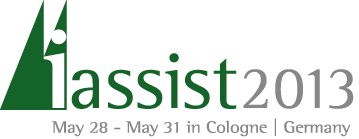Session C4
Beyond Theory: Data Management in the "Real World"
Track
- Research Data Management
Venue
- Adelheid
15:45-17:15
Chair/Moderator
- Lynda Kellam
University of North Carolina at Greensboro
Presenters
Data Management 2.0 - Real World Adaptation and User Feedback
- Stefan Friedhoff
Bielefeld University
Due to the demands of progressively more sophisticated data management, many researchers face problems while adapting existing DM strategies to their own research processes. The INF project (Information and Data Infrastructure), which assists data documentation across 17 projects within a Collaborative Research Center (SFB882) in the social sciences, identified three main problems for implementing data management strategies: methodological problems (1); acceptance problems (2); and, problems of granularity (3). Based on open interviews, focus groups and surveys, we were able to identify specific problems in these areas and were able to develop both technical as well as methodological solutions. In this presentation we present a systematization of problems; the corresponding resolving strategies; show to what extent documentation can be standardized in a research center holding heterogeneous data; as well as where it becomes necessary to adapt specific solutions to overcome methodological differences.
Bringing Researchers into the Game with FORSbase: An Integrated System for Archiving, Networking, and Survey Construction
- Brian Kleiner
Swiss Centre for Expertise in the Social Sciences (FORS)
Small data archives in Europe often lack the resources for adequate documentation and delivery of data. FORSbase is an IT project in the works at the Swiss Centre for Expertise in the Social Sciences. FORS in Lausanne will facilitate and automate documentation and access in order to free resources for promotional and training activities. Its goal is: to combine within a single system and database a wide range of archiving functions and tools for researchers to document and deposit their data; access data and metadata; establish contacts and communicate with other researchers; and, to create and carry out surveys. All of this is done within individual researcher workspaces, where specific project descriptions and data are safely stored. Within the workspaces, researchers will also have access to a messaging system, a question data bank, a survey management tool, and other resources to assist them in their work. The benefits of such a system for researchers are the ease with which they can manage and store their data, as well as search for and directly download the data of others. Plus, the system will provide tools that help in designing and implementing surveys that are documented throughout the life cycle.
Do We Need a Perfect Metadata Standard or is "Good Enough" Good Enough?
- Samuel Spencer
Open Source Developer
The role of the data archivist focuses on the collation and sharing of research information. Historically, the quality of incoming digital content has been poor, a state that has driven the need for standards which can adequately capture research activities. One such standard, the Data Documentation Initiative is held as the perfect standard for archivists due to its complex promotion of reuse of survey metadata. However, its complexity has made the creation of software targeted at researchers difficult. As such, with minimal uptake of the standard in the research community, the onus still falls on archivists to transcribe incoming data into this complex standard. This presentation takes an alternative approach and examines how it might be possible to create software targeting basic researcher needs, by simplifying the task of survey research. The aim of this is to create and promote an XML standard that is "good enough" for survey researchers that will increase software adoption among the survey research community, thereby improving the quantity and overall quality of incoming metadata delivered to social science archives.
